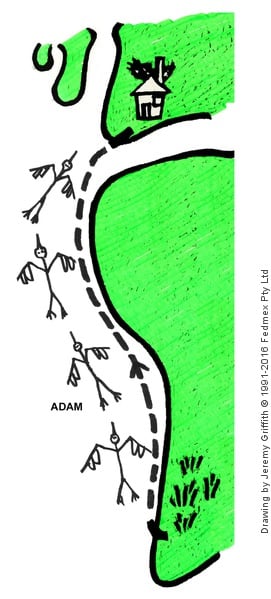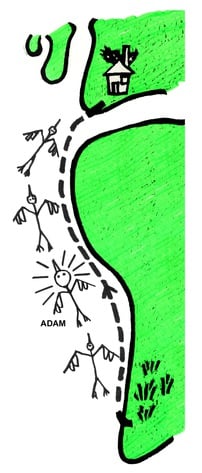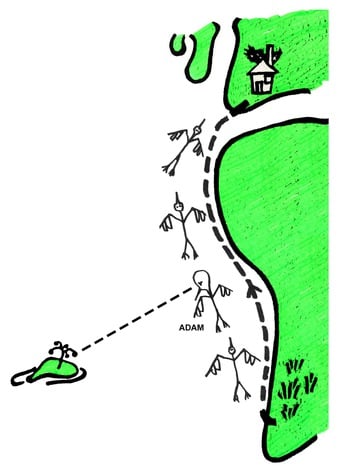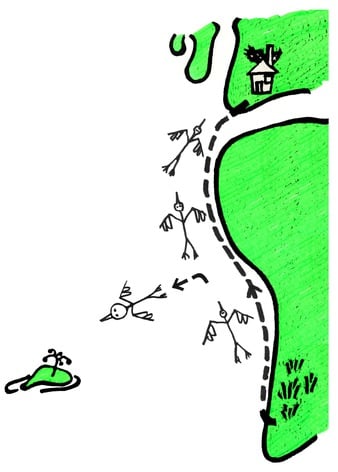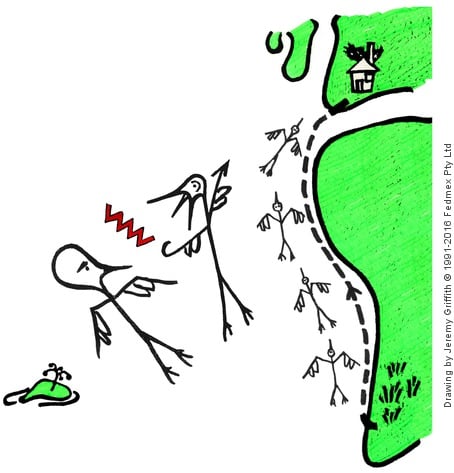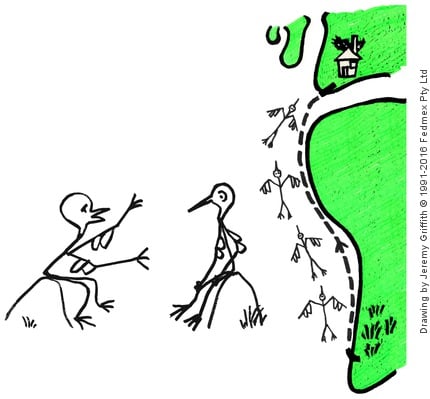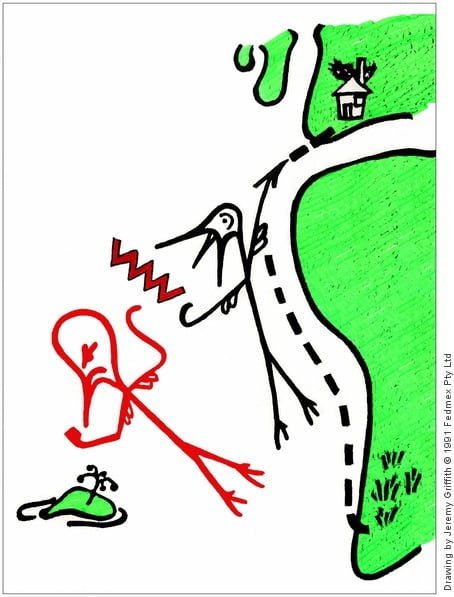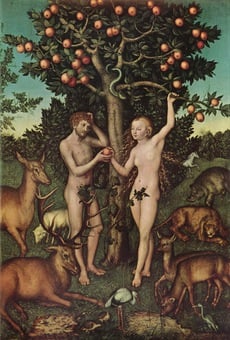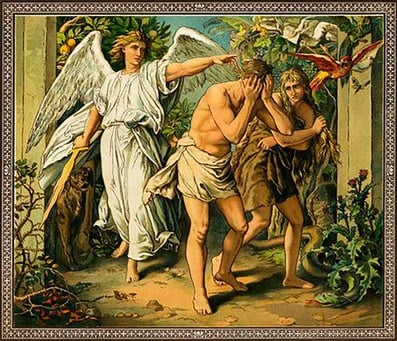Emmy Award-winning actor Pierre Bokma expresses his deep appreciation of Jeremy Griffith’s explanation of the human condition during his August 2024 appearance on Dutch TV’s Summer Guests (Zomergasten)
In August 2024, Pierre Bokma, who is recognised as ‘one of the Netherlands’ greatest actors’, appeared on Summer Guests (Zomergasten), the Dutch public broadcaster VPRO’s prestigious annual feature program, saying that he is ‘in awe’ of Jeremy Griffith’s ‘brilliant’ explanation of the human condition. The interview included an extended excerpt from Jeremy’s presentation of the ‘Adam Stork’ analogy from Video/Freedom Essay 3.
You can read Summer Guest’s profile of Pierre Bokma here (note, to read the profile in English you will need to use the Google translate feature).
Watch excerpts from Pierre Bokma’s Summer Guests interview here:
Excerpt 1 Transcript:
[Note that this Transcript is an English translation of the original Dutch. The Dutch transcript can be seen here.]
Narrator says: Pierre Bokma. The eternal fear of an actor is that he has lost his secret. But maybe the secret has lasted long enough. The man who once accidentally landed at the Maastricht Theatre School is the man we are talking about; and he is listed as one of the greatest actors of the Netherlands: twice he won the prestigious Louis D’or; four times a Golden Calf; once an Emmy, the most important American television award. Perhaps he made the biggest impression with his interpretation of David Cohen in The Jewish Council—“It is a role that changed my life”, he says himself. The general public knows Pierre from The Sheep with Five Legs. Or as the German teacher from the absurdist comic Rundvug. When Pierre plays, you go to watch. And when you watch, you see a character come to life completely. Hanneke Groenteman welcomes Pierre Bokma tonight.
Interviewer Hanneke Groentemann: Good evening. Welcome to Summer Guests. An evening with among others Gottfried Bomans; Prince Klaus; football hero, the Croatian footballer Luka Modric; Marlon Brando, and many others [these are some of the people featured in the clips that Pierre Bokma has chosen to play]. But especially an evening with my guest, and I am so honoured that he is here, the top actor, Pierre Bokma. Nice to have you here. If it’s up to me, we’re going to have a party tonight.
Pierre Bokma: Where is the party?
Hanneke: The party is here. And you have chosen a lot of beautiful things for us. But first I want to know, what did you do today? Sunday.
Pierre: Not that much actually. I went to a friend this morning. I watched a short clip.
Hanneke: What?
Pierre: Bomans. And I watched Jeremy Griffith’s ‘The Human Condition’…
Excerpt 2 Transcript:
Pierre: I’m just going to tell you, as far as it is unclear from watching the clips, what the clip is about, which part we’re taking, and what interests me in it.
Hanneke: Does that mean we will get to know you better?
Pierre: Maybe. I don’t know.
Hanneke: Or do you just want to know who Jeremy Griffith is?
Pierre: No, no, no. That’s fine. I mean, if, after the explanation, people at home think, I’ve never heard of it, it’s fantastic, what a beautiful new insight into the human status quo, condition, then of course you can look it up yourself and find it, and go further into it. That’s very much the intention.
Hanneke: But it’s also a little insight into yourself.
Excerpt 3 Transcript:
Hanneke: How about we get back to the human condition with Jeremy Griffith now?
Pierre: Yes, that’s what we were just talking about.
Hanneke: Yes, we were just talking about it. There’s a fantastic underlying thread in this one. We’ve had the film We Need to Talk About Kevin. We’ve had the ape, the puzzle regarding the ape [footage showing the incredible language ability of the bonobo Kanzi]. And now we get Jeremy Griffith: ‘The Explanation of the Human Condition’. Now, you insisted on this segment.
Pierre: Absolutely. Because it also helped to open my eyes. Because I think when professors start talking about a lot of these completely complex matters, which they mostly do it among colleagues, we understand very little of it. You think, ‘When will you come up with a brilliant formula, so that we can all understand it?’
Hanneke: What about? About the complexity…
Pierre: About the complexity of being human; and in particular, the brain. And from there we circle back, to the distinction made, how should we say it…through a quirk of nature, there was a species that came down from the trees, started walking upright more or less…because the trees disappeared and it turned into a savannah…and somehow instinctively gained an excessive brain mass. [We now know the nurturing based love-indoctrination process was the catalyst for the emergence of consciousness, not savannah living—see chapter 7:3 of Jeremy’s definitive book, FREEDOM.]
Hanneke: A big brain mass?
Pierre: Yes, a big brain mass. The brain somehow must have had a function too. And the problem was that the instinct and the conscious mind split apart from each other and suddenly became adversaries. And Jeremy Griffith explains this.
Hanneke: Your instinct says this and your mind says that.
Pierre: Your mind, your conscious mind, your conscious sense, and your self-awareness needs an explanation for things. The instinct says, ‘What are you doing now? You are supposed to follow the rules! We gave you the guidelines and the tools. And for the rest, you should do nothing at all! You must follow what you have been given. That’s it!’
Hanneke: And you think that Jeremy Griffith makes it crystal clear?
Pierre: Yes.
Hanneke: Now, we’ll talk about that in a moment. I had to watch it a lot before I understood. But yes, I’m not too smart. [The Instinct vs Intellect explanation is very simple but it does open up the historically off-limits subject of the human condition so people can initially struggle to access or ‘hear’ what is being explained. You can read about this ‘Deaf Effect’ in Jeremy Griffith’s presentation The Great Guilt that causes the Deaf Effect.]
Pierre: Not at all, but I explain it as I’m explaining it now: Here is instinct, here is consciousness. And instinct…because consciousness says, ‘No, I won’t do what instinct tells me to do anymore because you [instinct] don’t ask why. Well sorry, but I’m conditioned to ask why, I have to do something.’ And the aggression…that is because the instinct says so furiously, ‘No! You shouldn’t do that! You are good as you are already!’ That condition, Griffith says, makes us an angry, guilty, alienated, selfish, egotistic, power- and glory-hungry being. In short, we’ve got a real problem.
Hanneke: Yes! Let’s take a look at the clip from Jeremy Griffith’s ‘The Explanation of the Human Condition’ [from Freedom Essay 3]:
Jeremy Griffith: Basically, when we humans developed a conscious mind some 2 million years ago, a battle unavoidably developed between it and our already established instincts. The result of this conflict between our instinct and intellect was that we became psychologically defensive, angry, alienated and egocentric—the upset state we refer to as the human condition. But now that we can explain and understand this conflict, all those insecure, defensive behaviours are obsoleted, brought to an end, and we free ourselves from the human condition.
The easiest way to understand this tragic conflict within us and its solution is to apply our situation to another species.
Imagine a stork: we’ll call him Adam. Each Summer, Adam instinctually migrates North with the other storks to breed. Since he has no conscious mind he doesn’t think about or question his behaviour, he just follows what his instincts tell him to do.
But what if we give Adam a large brain capable of conscious thought? He will start to think for himself, but many of his new ideas will not be consistent with his instincts. For instance, while migrating North with the other storks Adam notices an island full of apple trees. He makes a conscious decision to divert from his migratory path and explore the island. It’s his first grand experiment in self-adjustment/self-management.
But when Adam’s instincts realise he has strayed they criticise his deprogrammed behaviour and dogmatically try to pull him back on his original course. In effect, they condemn him as being bad.
Imagine the turmoil Adam will experience: he can’t go back to simply following his instincts; his instinctive orientations to the migratory flight path were acquired over thousands of generations of natural selection, but those orientations are not understandings. Since his conscious mind requires understanding through experimentation, inevitably a war breaks out with his instincts.
Ideally at this point, Adam’s conscious mind would sit down and explain to his instincts why he’s defying them. He would explain that the gene-based, natural selection process only gives species instinctive orientations to the world, whereas his nerve-based, conscious mind, which is able to make sense of cause and effect, needs understanding of the world to operate.
But Adam doesn’t have this self-understanding. He’s only just begun his search for knowledge. In fact, he’s not even aware of what the problem actually is. He’s simply started to feel that he’s bad, even evil.
So, tragically, while searching for understanding, three things unavoidably happened. Adam defensively retaliates against the criticism, he tries to deny it and block it out of his mind, and he desperately seeks any reinforcement he can find to relieve himself of the negative feelings. He has become angry, alienated and egocentric, a psychologically upset state we call the human condition.
Adam’s intellect or ‘ego’ (which is just another word for the intellect since the Concise Oxford Dictionary defines ‘ego’ as ‘the conscious thinking self’ (5th edn, 1964)) became ‘centred’ or focused on the need to justify itself—Adam became ego-centric, selfishly preoccupied aggressively competing for opportunities to prove he is good and not bad, to validate his worth, to get a ‘win’; to essentially eke out any positive reinforcement that would bring him some relief from criticism and some sense of worth. He unavoidably became self-preoccupied or selfish, and aggressive and competitive.
Basically suffering psychological upset was the price we conscious humans had to pay for our heroic search for understanding. In the words from the song The Impossible Dream from the musical the Man of La Mancha, we had to be prepared to ‘march into hell for a heavenly cause’ [lyrics by Joe Darion, 1965]. We had to lose ourselves to find ourselves; we had to suffer becoming angry, alienated and egocentric until we found sufficient knowledge to explain ourselves.
The Biblical story of Adam and Eve in the Garden of Eden accurately describes the primary situation involved in our human condition of the psychologically upsetting battle that emerged between our instincts and our conscious intellect’s search for knowledge. It says Adam and Eve/we took the ‘fruit’ (Genesis 3:3) ‘from the tree of knowledge’ (Gen. 2:9, 17) and were ‘disobedient’ (the term widely used in descriptions of Gen. 3). In other words, we developed a conscious mind and free will. But in that pre-scientific story it says Adam and Eve then became perpetrators of ‘sin’ (Gen. 4:7) and as a result were ‘banished…from the Garden of Eden’ (Gen. 3:23) state of our species’ original innocence for having become ‘evil’ (Gen. 3:22), whereas this scientific presentation says, ‘No, no, that story got it wrong’.
Adam and Eve are actually the heroes of the whole story of life on Earth because surely the conscious mind is nature’s greatest invention and to be given the task of searching for understanding while the whole world’s condemning you was the hardest and toughest of tasks—because that condemnation was universal. All the other innocent storks are condemning the search for knowledge, and since all of nature, the rain, the clouds, the trees, other animals, are all associated with our original instinctive self, the whole world, in effect, ganged up on Adam and Eve/i.e. us humans—and yet all the time we were good and not bad but we couldn’t explain why, but now at last we can.
Our species has lived with the human condition for some 2 million years—the probable time we have been conscious—and it’s taken tremendous courage to withstand the relentless criticism from our instincts. But finally the knowledge that science has given us of the difference between instinctive orientations and conscious understandings allows us to explain that we didn’t deserve this criticism—that we conscious humans are good and not bad after all.
And significantly, now that we are able to understand from scientific first principles that upset is not an ‘evil’, worthless, bad state, but an immensely heroic state, we can know that while, inevitably, all humans are variously upset from their different encounters with, and degrees of engagement in, humanity’s epic search to find knowledge, ultimately for self-knowledge, understanding of the human condition, ALL HUMANS ARE EQUALLY GOOD. Everyone is variously angry, egocentric and alienated, but everyone is good, and not just good but a hero of the story of life on Earth!
______________________
Hanneke: I see you looking completely in awe at this man.
Pierre: Yes!
Hanneke: He says, ‘We are ultimately good’.
Pierre: Exactly!
Hanneke: While, if I read, watch, and follow the world around me, I think ‘In the end, are we good??’ How [can we be good when all the evidence suggests we aren’t]?
Pierre: Well, of course everyone should understand a bit of what Jeremy says. He does explain it.
Hanneke: That’s you here now, isn’t it?
Pierre: No, I am not an emissary of Jeremy. But I am someone who understands what he says…If everyone realises where this conflict in ourselves and thus towards ourselves individually, and on an ever larger scale, causing wars to start and so on…If someone understands why you are so frustrated and alienated and angry, and always seeking power and validation and glory, knowing this, you can push away that frustration and say, ‘I am good because I have power and I can decide things’. There’s no need for these things if you understand what it is about…If you understand that instinct and your consciousness don’t have to be enemies at all.
Hanneke: No, but they have developed into enemies. If you then take him [Jeremy Griffith] as a sort of an authority, then you must be able to organise that clash within yourself. Can you do that?
Pierre: Yeah. Yeah. Well, I try. I feel a lot of frustration and anger and such, that’s probably a part of my character as well, it has been formed that way. Because sometimes I have instinctive feelings where I think, ‘No, I shouldn’t do that’ but I should first find an explanation why I feel that way.
Hanneke: Is that any different from a really good therapy?
Pierre: I don’t know. Some therapies use different wording, but a lot of good therapies start from a revelation…of a disconnection from yourself, from who you really are, your own self; and develop a process where you recognise you are alienated and lost. And bringing your lost self back to and uniting with your actual self. And your actual self—well, I am a great admirer of the given human being. It is with full awe that I live, that I am there in this wonderful universe. Whether it is true or not, anyone can come up with a theory. I am always very interested.
Hanneke: And have you ever felt very lost...
Pierre: Yes.
Hanneke: ...very alienated from your motivations?
Pierre: Yes, I think I have.
Hanneke: How?
Pierre: Well, I think it’s very difficult to understand certain concepts, that you normally don’t get in family situations. Even though an upbringing is sometimes bad or traumatic or stressful, but you are given a structure that you see around you. And you feel it within your family, that you are connected by birth, you are family, you are, so to speak, unbreakably connected. That is something I don’t have at all. So then you become a bit of a wanderer, then due to various traits you have, you can manage it quite well, it goes very well. But you are left with a large emptiness that resists you going there. So you go around in a circle, because if you end up there, you are lost, what we’re talking about now. Yes, that is indeed a fear.
Hanneke: Is that something you can control a bit through Griffith’s explanation? You might not be able to get over it, but it may give you more control over your lostness?
Pierre: It’s a start. And it’s a start that is unlike other things I’ve thought about or people who have tried to help me.


